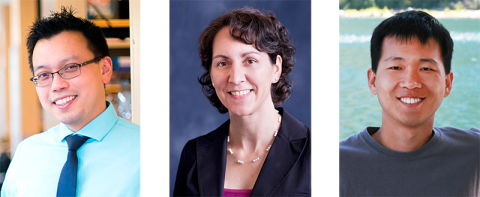event
Tenure Celebration for Wilbur Lam, Machelle Pardue, and Peng Qiu
Primary tabs
Please join us for a seminar and reception to celebrate the tenure and promotion of Wilbur Lam, Machelle Pardue, and Peng Qiu.
Tuesday, May 16
4:00 - 5:30 p.m.
Petit Institute, Suddath Room, 1128
Reception to follow with refreshments and food
The following topics will be presented:
Wilbur Lam, Associate Professor
"Clinical Translation of Engineered Microsystems for Hematologic Applications"
Our laboratory takes a multidisciplinary approach spanning biology, physics, engineering, and medicine to develop new tools to answer hematologic questions that are technologically infeasible with current systems. While our basic interests involve developing microsystems to investigate the cellular mechanics of hematologic processes at the micro-to-nanoscales, these microengineered devices can then be adapted to function as novel pre-clinical disease models, clinical diagnostics, and drug discovery platforms. Overall, we adopt a “basement-to-bench-to-bedside” approach in which the invention, translation, and clinical assessment of diagnostic and therapeutic microtechnologies takes place under one scientific “roof” with the ultimate goal of improving the lives of patients with blood disorders.
Machelle Pardue, Professor
"Lost in Translational Research"
The goal of biomedical research is to move treatments, therapies, and devices from bench to bedside. However, how much basic research really gets to the clinic? Are scientists trained to ask the right questions to translate research into patient use? Do funding agencies and grant reviewers look favorably on studies designed to facilitate translation? This talk will examine how we perform biomedical research and the challenges of implementing research findings into the clinic.
Peng Qiu, Associate Professor
"Machine Learning in Biomedicine"
Peng Qiu will discuss several ideas and applications of machine learning in biomedicine engineering. He will present the idea of progression analysis which challenges the common discrete mindset in machine learning, and shifts toward modeling the continuum of biological progression and differentiation. He will also talk about the idea of manifold learning for experimental design and model reduction in systems biology dynamic modeling. In addition, he will touch upon a few other ongoing projects and collaborations, showing the variety of biological problems that can benefit from computational and machine learning analysis.
Status
- Workflow status: Published
- Created by: Walter Rich
- Created: 05/04/2017
- Modified By: Walter Rich
- Modified: 05/04/2017
Categories
Keywords
User Data
Target Audience

